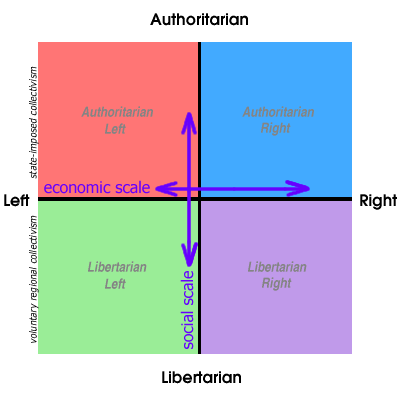Last week, I used Paul Krugman's commentary on Reagan-style Keynesianism to suggest that we don't actually think about politics in rational, policy-based terms. I'd like to flesh out that point, which I suspect will become a frequent one at The Divine Perspective.
I have a libertarian friend who always objects to having his kind categorized as part of the "Right." Fine, almost all my libertarian friends object to being put in the righty basket. They tend to prefer systems like The Political Compass that provide a dual-axis model of ideology:
To the extent that political behavior is founded on policy preferences, this sort of scheme obsoletes a traditional left-right spectrum. To the extent that politics is about models of governance, my libertarian-minded friends are right to object to the traditional spectrum; their ideal government looks strikingly different from a conservative or fascist regime.
So why has the traditional left-right model been the dominant popular tool for sorting ideology in the modern era (in fact ever since the French Revolution)?
My answer, simply stated: political behavior is founded on moral-emotional world views. Policy preferences are, most fundamentally, expressions of those world views. And the traditional left-right classification system adequately, if crudely, describes the psychological spectrum underlying the political spectrum.
Before I dive into the argument, I'd like to illustrate what I mean using an example stolen from one of my undergraduate political science professors . Let's think back to the Henry Louis Gates controversy from a few years ago.
When most of us heard the news about a black Harvard professor getting arrested for trying to break into his own home, we knew exactly what had happened.
Lefties like me knew how it went down: a racist cop responded to a racist telephone call; just another chapter in the history of pervasive cultural oppression of minorities. We likely knew it instantly upon seeing the headlines, still completely ignorant of the actual facts. I suspect that most righties summarily reached a different conclusion: another poor cop, just trying to do his job, was about to be forced to run the gauntlet of the politically correct liberal media choir. And once again, I'm willing to bet that most righty minded folks reached this conclusion before reading any of the actual facts.
By now I suspect that many readers (if there are any readers...) are bouncing around in their chairs, protesting: "But I waited to react to that controversy until I knew the facts. I read the news, thought about the situation, and came to rational, fair-minded judgement of the incident." And I'm sure many people did respond in a fair-minded way to the incident.
But the Gates incident is easier to fairly analyze than the vast majority of actual political issues. It's a situation we can all imagine with some accuracy: a man gets locked out of his house and starts being rough with the front door; a vigilant/nosy neighbor calls the police. This incident doesn't feature any tricky abstract ideas or require any particular expertise to decode. Let's think about more common political issues, issues steeped in complexity and far beyond the day to day experiences of the average citizen, issues like "the role of regulation in the economy."
Almost every politically minded person I know, lefty or righty, has some stridently held views on the state's role in the economy. And yet most liberals I know couldn't come close to articulating even the most fundamental explanations of why markets should be efficient in first place. And most righties I know are ignorant of even the most uncontroversial accounts of why markets can lapse into inefficiency.
We like to walk around pretending we have logically founded positions on the role of the state in economic regulation, but almost none of us do. We're kidding ourselves. Smart men spend decades studying price signals and market failures, and most of these smart men only barely understand what they're talking about. I'm a relatively high information voter in the scheme of things (I spend two or three hours a day reading about politics, policy, and economics), and I have no idea what the hell I'm talking about most of the time.
So how do we choose? If our empirical justifications for our political beliefs are superficial, why do we choose the justifications we do?
I'll address those questions in Part II, tomorrow.


Well, I'll comment. The literature on political belief inheritance is scant. Seems to boil down to how rebellious, as opposed to intelligent, the child is to his/her parents' views. Non-ideological parties--I'm tihnking Finnas Fail/Gael in Ireland--are comprised of families, not individuals. http://www.nytimes.com/2005/06/21/science/21gene.html?_r=1&pagewanted=print
ReplyDeleteRight! I've always found the research on family politics a little limited, if necessary. It confirms our basic intuition that most of us believe what our parents believe. I think this confirms the basic account of ideology's ties to psychology but doesn't really give an account of *why.* Are we just following our parents because that's what kids do? Are we receiving one sided information from are parents? Are we inheriting moral codes from our parents that inherently lean toward one ideology or another? (See Daily Reads today for an interesting evolutionary account via the Atlantic).
ReplyDeleteI lean, with Lakoff and Co., toward an imparted moral worldview type theory. More on that tomorrow. But no definitive empirical research in this area that I've seen. So ripe for bloviation.